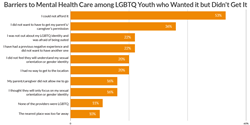
Barriers to Mental Health Care Among LGBTQ Youth
COVID-19 has highlighted vast disparities that exist within the U.S. mental health care system, while also demonstrating that mental health care can be effectively provided via telephone or video conferencing when necessary.
NEW YORK (PRWEB)
August 18, 2020
Today, The Trevor Project, the world’s largest suicide prevention and crisis intervention organization for lesbian, gay, bisexual, transgender, queer & questioning (LGBTQ) young people, released new research that highlights the prevalence of unmet mental health care needs among LGBTQ youth, a population that has been found to be at significantly increased risk for depression, anxiety, and suicide. The report, “Breaking Barriers to Quality Mental Health Care for LGBTQ Youth,” details the numerous barriers LGBTQ youth face when trying to access mental health care and how those barriers operate within and across intersecting social identities. Overall, more than half (54%) of LGBTQ youth who reported wanting mental health care in the past year did not receive it.
The most commonly endorsed barrier was the inability to afford care (53%). LGBTQ-specific barriers included concerns around being outed (22%), not having their LGBTQ identity understood (20%) or overly focusing on their LGBTQ identity (16%), and not finding a provider who was LGBTQ (11%). Youth-specific concerns relating to not wanting to get parental permission (36%) and having parents who refused to allow care (16%) were also endorsed by LGBTQ youth. Additional barriers endorsed by LGBTQ youth include previous negative experiences (22%) as well as transportation concerns, such as having no way to get to the location (20%) or having the location be too far away (10%).
Race/ethnicity, gender, geography, and socioeconomic status were all significant predictors of whether or not an LGBTQ youth received the mental health care they desired. For example, Latinx and Asian American/Pacific Islander youth were approximately 40% more likely and Black youth nearly 30% more likely to have unmet mental health care needs compared to non-Hispanic White LGBTQ youth. Cisgender LGBQ youth had greater reports of unmet mental health care needs (57%) compared to transgender and nonbinary youth (50%), due in part to the inclusion of mental health treatment in the standards of care for transitioning.
Additional key findings include:
- Black, Latinx, and Asian American/Pacific Islander LGBTQ youth highlighted concerns related to mental health stigma within their culture as well as a mental health system that wasn’t equipped to understand their racial/ethnic identities. Some LGBTQ youth of color expressed concerns about the ability of predominantly White mental health care providers being able to understand the impact of racism on their mental health.
- One in three transgender and nonbinary youth stated that they didn’t receive desired mental health care because they didn’t feel a provider would understand their sexual orientation or gender identity. Transgender and nonbinary youth also endorsed higher levels of many barriers compared to their cisgender LGBQ peers, including cost, negative experiences in the past, and concerns about being outed.
- Insurance challenges were very frequently mentioned as a reason youth were unable to receive desired mental health care. This included both lack of insurance coverage as well as insurance coverage that was too limiting to provide appropriate care.
“Given the disproportionately higher rates of mental health challenges and suicide attempts reported by LGBTQ youth, any barriers to mental health care can have enormous consequences. We must act now to break down these barriers to save lives,” said Dr. Amy E. Green, Director of Research for The Trevor Project. “Establishing a mental health care system that is equitable, effective, and available for all will not be easy. It will require major investment in public-funded programs and a wide variety of policy changes aimed at expanding access, improving the cultural competency of providers, and eliminating structural barriers. And from the top down, we must all work together to actively confront mental health stigma and reduce fears around asking for help.”
Dr. Green added, “COVID-19 has highlighted vast disparities that exist within the U.S. mental health care system, while also demonstrating that mental health care can be effectively provided via telephone or video conferencing when necessary. The advancements in telehealth services prompted by the pandemic have expanded the ability for those in need to receive care and should be adopted and expanded upon long term.”
The white paper uses new data from the organization’s 2020 National Survey on LGBTQ Youth Mental Health, in which a diverse national sample of more than 40,000 LGBTQ youth between the ages of 13–24 in the United States was surveyed. The report in its entirety can be found here.
If you or someone you know is feeling hopeless or suicidal, The Trevor Project’s trained crisis counselors are available 24/7 at 1-866-488-7386, via chat http://www.TheTrevorProject.org/Help, or by texting START to 678678.
About The Trevor Project
The Trevor Project is the world’s largest suicide prevention and crisis intervention organization for lesbian, gay, bisexual, transgender, queer & questioning (LGBTQ) young people. The Trevor Project offers a suite of 24/7 crisis intervention and suicide prevention programs, including TrevorLifeline, TrevorText, and TrevorChat as well as the world’s largest safe space social networking site for LGBTQ youth, TrevorSpace. Trevor also operates an education program with resources for youth-serving adults and organizations, an advocacy department fighting for pro-LGBTQ legislation and against anti-LGBTQ rhetoric/policy positions, and a research team to discover the most effective means to help young LGBTQ people in crisis and end suicide.
Share article on social media or email:

